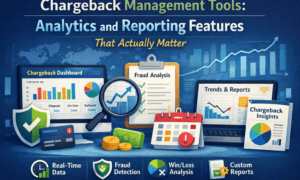Chargebacks are a regular part of doing business, but we wouldn’t know why they occurred in the first place without a reason code. A chargeback reason code can offer merchants a lot of information, including which chargebacks you should fight and how to rework your return policy.
What are Chargeback Reason Codes?
Chargeback reason codes are issued by the bank when a customer files for a chargeback. These codes will explain why the chargeback was filed. Reason codes will only display the code, so you’ll have to look up a chargeback reason code here to know what the code means.
How do Reason Codes Fight Chargebacks?
When your customer files a chargeback with a bank, the cardholder has to declare why they did it by selecting a reason code. The banks may or may not investigate this claim. It depends on the customer’s reputation for filing chargebacks and whether the company is in good standing.
Regardless of who was at fault for the chargeback, the bank will typically side with the customer, especially if the charge is in a gray area. That means you’ll experience many illegitimate claims.
However, the reason code provided by the bank will be the evidence you need to fight these chargebacks if you have evidence they were illegitimate. If the code was legitimate or the bank still denies your dispute, you can use reason codes to strengthen your retail return policies.
The Chargeback Reason Code Format
Chargeback reason codes are alphanumeric, numeric, or alphabetic. The four main credit card companies will use different codes to describe the same chargeback reason. Let’s take a look.
Visa Chargeback Reason Codes
Visa chargeback reason codes are separated into four sections: Authorization, Processing Errors, Fraud and Consumer Disputes. Each code starts with a 2-digit number followed by a decimal and 1 number. For example, Fraud begins with 10, and Authorization starts with 11.
Visa used to use a 2-digit number for their reason codes. For example, reason code 41 used to stand for “Canceled Recurring Transaction,” but now, 13.6 has replaced 41 for this dispute.
Mastercard Chargeback Reason Codes
Mastercard chargeback reason codes are separated into five sections: Authorization, Point of Interaction Error, Fraud, Cardholder Disputes, and Other. Each code starts with a “48,” followed by 2 other numbers. Most codes will use the same 4-digit number for multiple disputes.
For example, any 4853 code will count as a “Cardholder Dispute” even though there are 10 given reasons for this dispute. Mastercard will let you know the details of these disputes.
American Express Chargeback Reason Codes
American Express chargeback reason codes are separated into five sections: Authorization, Fraud, Card Member Dispute, Processing Error, and Inquiry/Miscellaneous. Each code starts with a letter that corresponds to the section (“F” for Fraud) followed by 2 numbers.
In the Inquiry/Miscellaneous section, some reason codes will use “R” or “F” rather than “M” for miscellaneous. For example, FR2 in this section means “Fraud Full Recourse Program.”
Discover Chargeback Reason Codes
Discover chargeback reason codes are separated into five sections: Fraud, Authorization, Processing Errors, Services, and Other. Each code will be made up of 2 letters In every section except Fraud. Fraud codes will start with a “UA” and end with a 2-digit number value.
In the Services section, you’ll find a code that’s only a numeric value. The reason code “05” will be issued if the cardholder initiated a good faith investigation and you accepted liability.
Common Chargeback Reason Code Categories
Credit card companies don’t have a consistent error code system, but that doesn’t mean there isn’t consistency in how they categorize chargebacks.
Here are some common code categories:
- Fraud or Lack of Authorization: Chargebacks in this category fall under legitimate criminal fraud or were made under the assumption that fraud occurred when it didn’t.
- Cancel Recurring Payments: Chargebacks in this category can happen if the customer was still charged for a subscription after canceling it or forgot to cancel it.
- Products and Services: Chargebacks in this category relate to the quality of your products or services. For example, a product arrived broken or without a key part.
- Technical Criminal Fraud: Non-chip chargebacks or fraud not blocked by software.
- Other or Miscellaneous: Anything that doesn’t fall in the previous categories.
You can use these codes and categories to detect, prevent, and win chargeback disputes.



































